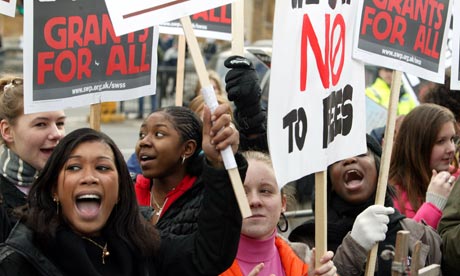Imagine that, in a fit of pre-election generosity, the government proposed setting up a fund, financed from general taxation, to which 18-year-olds could apply for gifts of around £13,000. Imagine the gifts were available to less than half the age-group and the lucky ones were selected overwhelmingly from affluent, middle-class families. And imagine one final thing: to show it really loved these pampered people, the government gives them further gifts of £4,000-£5,000 if they later get good jobs with high earnings.
You would think ministers had gone mad, and probably take to the streets in outraged protest. You would think it very strange if people calling themselves socialists or believers in social justice failed to oppose the proposal. You would find it stranger still if they complained it didn't go far enough, and that the gifts for 18-year-olds should be nearly £10,000 higher.
But this is not a fantasy: such a fund exists and it helps university students. Despite the introduction of tuition fees – £3,290 for the next academic year – it costs at least another £4,300 annually to meet the full cost of educating a student. That money comes from taxes, mostly paid by people on modest incomes. Even the fees come from government-financed loans, which are repaid, after graduation, over periods of up to 25 years. The repayments are (rightly) contingent on earnings, and graduates who never earn more than £15,000 annually don't pay back a penny. But even those who become bankers never repay the full value of their loans. Because repayments increase only with inflation, the real interest rate is zero. So high-earning graduates receive, in effect, a subsidy of around £500m a year.
Whichever party wins the election will have to find public spending cuts. Student financing offers substantial savings, while also allowing at least some universities to increase their income by charging more in fees than they now get from the government. It is a win-win. Fortunately, student funding is being reviewed by a committee under Lord Browne, due to report this autumn. But any proposal to increase fees and/or charge a market rate of interest on loans will provoke noisy protests. They will come not only from middle-class parents, who well understand how their children's bread is buttered, but also from the Labour left and others calling themselves "socialists".
That, to me (a socialist), is baffling. The left wants to restore completely free university education. But free tuition, particularly alongside non-repayable maintenance grants, was compatible only with confining higher education to an elite. Indeed, the continuing commitment from public funds has caused restrictions on university entry for 2010-11, denying opportunities to thousands of young people. I, too, favour free, universal public services – schools, hospitals and so on. Though the more affluent could afford to pay, availability to all enhances social solidarity and ensures public services aren't second-class. But higher education isn't universal: it is distributed not by right or by need, but by perceived merit. And the selected ones come mostly from more prosperous families. They will themselves go on to significantly higher earnings than average. Where is the social justice in that?
The left pleads that fees deter disadvantaged students. They do no such thing, and it would be surprising if they did, since nobody pays upfront fees and the poorest get non-repayable grants. Young people from disadvantaged areas are now 50% more likely to enter higher education than 15 years ago. The figures might be better if some of the subsidies on fees and loans were transferred to poor students' grants. The left also laments "the burden of debt". Why students should worry about an interest-free debt they will repay only if they can afford it is not explained. Since the repayments are through payroll deductions, the left's complaint is no more justifiable than the right's about "the burden of tax".
Far from opposing higher fees, the left should demand their immediate introduction. No other policy, while cutting the budget deficit, would enhance both social justice and the health of universities.













